 Petzlover
Petzlover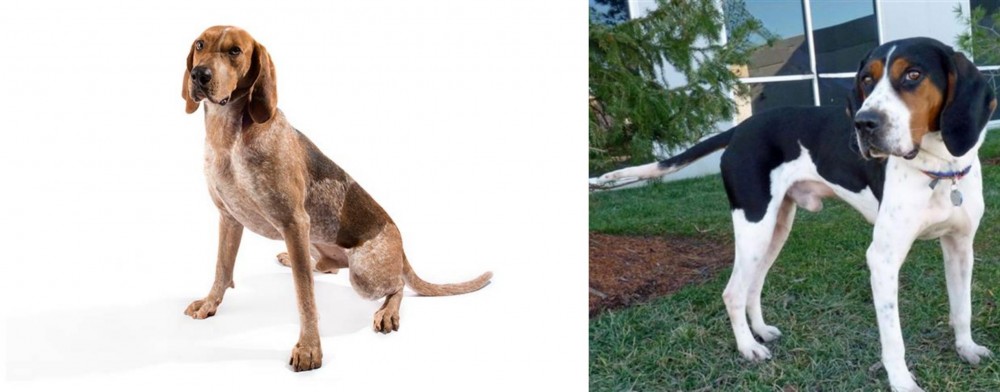 Both English Coonhound and Treeing Walker Coonhound are originated from United States. Both English Coonhound and Treeing Walker Coonhound are of same height. Both English Coonhound and Treeing Walker Coonhound are having almost same weight. Both English Coonhound and Treeing Walker Coonhound has almost same life span. Both English Coonhound and Treeing Walker Coonhound has same litter size. Both English Coonhound and Treeing Walker Coonhound requires Low Maintenance.
Both English Coonhound and Treeing Walker Coonhound are originated from United States. Both English Coonhound and Treeing Walker Coonhound are of same height. Both English Coonhound and Treeing Walker Coonhound are having almost same weight. Both English Coonhound and Treeing Walker Coonhound has almost same life span. Both English Coonhound and Treeing Walker Coonhound has same litter size. Both English Coonhound and Treeing Walker Coonhound requires Low Maintenance.
 The interesting thing about the English Coonhound is that he originated in the United States, in the southern states. It is also called the American English Coonhound and recognized as such by the AKC. Its ancestry however is British coming from the hunting hounds- the Foxhounds- that were brought to the United States from England in the 17th and 18th centuries and were the base for the Virginia Hounds. These hounds came from dogs that were imported for George Washington, Thomas Walker and Robert Brooke. These Virginia Hounds were then developed into the English Coonhound.
The interesting thing about the English Coonhound is that he originated in the United States, in the southern states. It is also called the American English Coonhound and recognized as such by the AKC. Its ancestry however is British coming from the hunting hounds- the Foxhounds- that were brought to the United States from England in the 17th and 18th centuries and were the base for the Virginia Hounds. These hounds came from dogs that were imported for George Washington, Thomas Walker and Robert Brooke. These Virginia Hounds were then developed into the English Coonhound.
A dog was needed that could handle the rougher terrain of the United States and hunt American Red Fox and racoons. Interestingly it was England, through the UKC, that first recognized the breed in 1905, labeling it the English Fox and Coonhound. The AKC recognized it in 2011.
Development of this group of hounds continued when the Treeing Walker Coonhound was split off as its own breed in 1945, and the Bluetick Coonhound followed in 1946. The English Coonhound can tree a prey or corner it until the hunter arrives. They hunt in packs or they can work one on one with the hunter. Either way they excel at finding and holding their prey “at bay”.
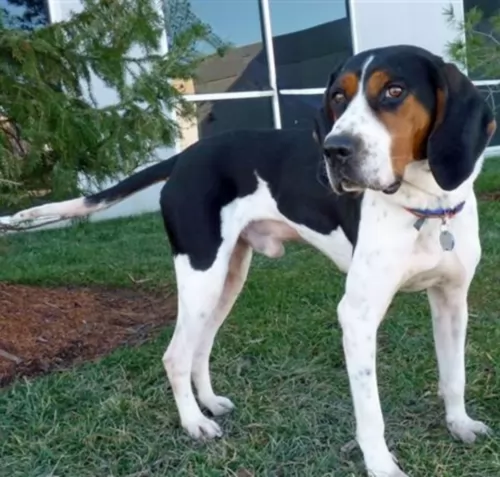 The Treeing Walker Coonhound originated in the United States and comes from English and American Foxhounds.
The Treeing Walker Coonhound originated in the United States and comes from English and American Foxhounds.
The fact that the dog has the word ‘Treeing’ in its names means that it is a hound dog that runs after its prey, sending it running up a tree to escape until the hunter reaches the tree and can shoot the prey.
 The English Coonhound is a medium sized dog with a domed head and a deep chest. His build is very athletic. He has dark eye and low-hung ears. The coats of the English Coonhound are extremely variable. For the most part there are three distinct types – the Redtick, the Tricolor and the Bluetick. They can be in any of these categories and have ticking of any color. The most predominate of this group is the Red. So, predominate is the red that the breed is often called the Redtick Coonhound by many.
The English Coonhound is a medium sized dog with a domed head and a deep chest. His build is very athletic. He has dark eye and low-hung ears. The coats of the English Coonhound are extremely variable. For the most part there are three distinct types – the Redtick, the Tricolor and the Bluetick. They can be in any of these categories and have ticking of any color. The most predominate of this group is the Red. So, predominate is the red that the breed is often called the Redtick Coonhound by many.
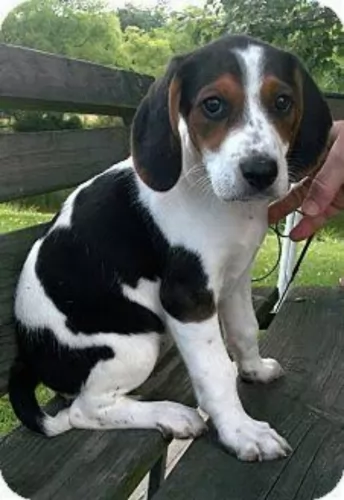 The Treeing Walker Coonhound looks very similar to a Beagle, just with much longer legs.
The Treeing Walker Coonhound looks very similar to a Beagle, just with much longer legs.
He stands at between 51 and 69cm in height both male and female and it weighs between 23 and 32kg.
The coat is short and glossy being either bi- or tri-colored – white, tan and black. The body and legs are strong and muscular. He has fairly long, floppy ears. The eyes are brown, intelligent and alert while having quite a gentle expression.
The muzzle is long and narrow. He has large, floppy pendant ears. The eyes are large, brown and have a soft and gentle expression. The tail is set high and is long.
This breed may be an excellent sport dog but he loves spending time quietly with his human family too, making a great family pet.
He is gentle and makes a great playmate for disciplined children. He is intelligent and it will do both owner and dog the world of good to have him trained and socialized.
They’re stubborn dogs, so it simply makes him well behaved, balanced and a pleasure to have around. He will learn commands easily and readily. If you want a good family pet, the Treeing Walker Coonhound is even-tempered and non-aggressive.
 The English Coonhound is quiet when at home and loud when hunting. They love to cuddle up on a couch and they are great pets. However, they still have a very high prey drive and need a lot of exercise as previously mentioned. They love kids and will be very loyal, hoping to please you all the time. They are curious and if left alone can be destructive. They can also be stubborn and strong willed, and they will howl when caged. If you are going to crate them, train them to it from 3 months on.
The English Coonhound is quiet when at home and loud when hunting. They love to cuddle up on a couch and they are great pets. However, they still have a very high prey drive and need a lot of exercise as previously mentioned. They love kids and will be very loyal, hoping to please you all the time. They are curious and if left alone can be destructive. They can also be stubborn and strong willed, and they will howl when caged. If you are going to crate them, train them to it from 3 months on.
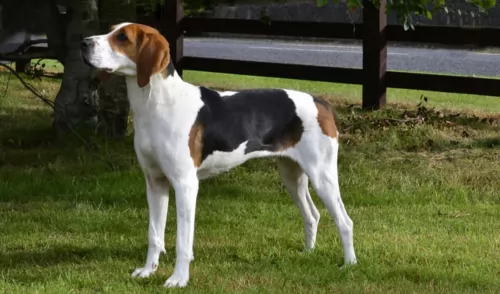 These dogs are loving, loyal confident, social and intelligent, making good companion dogs.
These dogs are loving, loyal confident, social and intelligent, making good companion dogs.
Whether they're outdoors being full of energy and on a hunt, they always give of their best. When they're at home with their human family, they put work behind them and become gentle, mellow pets, loving to just take it easy with their human family.
 The English Coonhound is an exceptionally hardy breed. The only serious situation they regularly face is Bloat. Bloat appears when the dog eats a large meal too fast after exercising or eats too large a meal before exercising. What happens in bloat is the stomach is distended and the intestine can wrap around vital organs and kill the dog.
The English Coonhound is an exceptionally hardy breed. The only serious situation they regularly face is Bloat. Bloat appears when the dog eats a large meal too fast after exercising or eats too large a meal before exercising. What happens in bloat is the stomach is distended and the intestine can wrap around vital organs and kill the dog.
Breeders do test for elbow and hip dysplasia but the is not a lot of this in the breed.
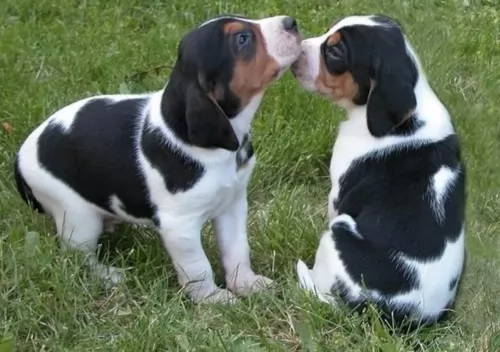 The Treeing Walker Coonhound is looked upon as a healthy dog breed that can be 10 – 13 years of age. Even so, there are diseases that can plague him, and hip dysplasia and ear infections are two that you need to be aware of.
The Treeing Walker Coonhound is looked upon as a healthy dog breed that can be 10 – 13 years of age. Even so, there are diseases that can plague him, and hip dysplasia and ear infections are two that you need to be aware of.
This is when the ball and socket joint isn't formed properly so that there is a grinding action of the joint instead of it sliding smoothly. This common skeletal disease is found in young and old dogs, and it seems more prevalent in larger dog breeds.
Your dog will have pain in the hip joints and even loss of muscle mass in the thigh area. You’ll notice that he becomes less active. Your dog will need to get to the vet so that the vet can suggest treatment for pain and to make him more comfortable.
As a floppy-eared dog, the Treeing Walker Coonhound will scratch at his ears and shake his head if he has an ear infection. With an ear infection inflammation affects the ear canal and can result in deafness. With his floppy ears moisture within the ear can attract bacteria and yeast.
Your pet will need to get to the vet because an ear infection is a painful condition.
 When feeding your English Coonhound be aware that this athlete loves to eat. You have to keep him from growing obese as his tendency to overeat is high. He uses a lot of energy on the hunt so if he is a hunting dog perhaps he needs more calories. Be careful when and how you feed him so that he won’t get bloat.
When feeding your English Coonhound be aware that this athlete loves to eat. You have to keep him from growing obese as his tendency to overeat is high. He uses a lot of energy on the hunt so if he is a hunting dog perhaps he needs more calories. Be careful when and how you feed him so that he won’t get bloat.
As previously mentioned the American English Coonhound is a very hearty breed and its most serious issue is Bloat. However, they also have long, floppy ears.
Because they were bred to hunt they need a lot of daily exercise. Jogging, brisk walking, or playing at t dog park are good activities for him. If they don’t get enough energy they become high strung and can engage in destructive behavior. Don’t let them off leash as they might wander off after any scent they capture. They love to chase a ball and you’ll wear out before they do. He might be good at lure chasing.
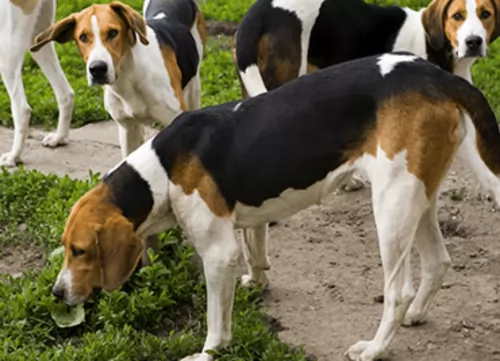 ● A healthy diet with vitamins and minerals as well as essential fatty acids is imperative. To get this in a commercially manufactured dog food, you will need to buy the best, high-quality ones. Some of the inferior brands have all kinds of bad stuff in them such as colorants preservatives and fillers.
● A healthy diet with vitamins and minerals as well as essential fatty acids is imperative. To get this in a commercially manufactured dog food, you will need to buy the best, high-quality ones. Some of the inferior brands have all kinds of bad stuff in them such as colorants preservatives and fillers.
Try and give him some homemade food such as boiled chicken, brown rice and vegetables. Dogs want simplicity in their foods. They can't stomach highly spiced, salted and exotic foods. Plain, wholesome foods keep him healthy and happy.
● It is recommended that you have your dog spayed or neutered. Not only will you prevent an unwanted litter, having them spayed or neutered prevents serious diseases later on. Also, have
your Treeing Walker Coonhound immunized to prevent some of the deadly canine diseases there are.
●These dogs are active, sporty dogs known for their stamina. To keep them lean, athletic and fit, they will require lots of exercise. They love a walk but will require more than a regular walk. Hikes are more what they have in mind. They never tire of hectic ball games, hide and seek and swimming. Because they are active, alert and intelligent dogs, they will need mental stimulation too.
● Your Treeing Walker Coonhound isn't a high maintenance dog because their short coat is easy to keep groomed just by giving him a good brush once or twice a week.
Make the grooming session a time to check him over for ticks and fleas and any unusual lumps on his body. It's a time to look at his eyes to make sure they're clear and bright without any discharge. Check inside his ears for redness and infection.
Trim his nails too. Remember he can't tell you about his teeth, so try and look inside his mouth to see that all is well. A good sign of bad teeth is bad breath. There are professional groomers who are willing to do all these grooming chores for you.